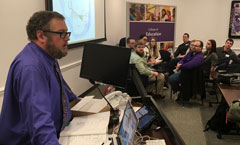February 21, 2018
'Teach less, better' is key concept in social studies symposium

About 50 current and future social studies teachers spent Feb. 2 in Bluemont Hall trying to avert world war during the 12th annual Social Studies Symposium, a professional development exercise.
Brad Burenheide, associate professor of curriculum and instruction, led the symposium where participants were divided into six groups. Each group received a manila envelope containing the name of their fictitious country, a flag, rules for diplomacy and an outline of their nation's position relative to their neighbors.
"In the 30-plus times I have given this exercise, only once was war averted," Burenheide said. "One group quickly realized there was no way everyone was going to get what they wanted so they pulled all the groups together to work on a solution. It was a stunning display of diplomacy."
Throughout the symposium, Burenheide offered several strategies on how to teach complex concepts to students ranging in age from fifth grade to high school.
"One of the maxims I share with my students is to 'teach less, better,' which means we need to not worry about the breadth of the textbook but make sure our students are getting the big ideas contained within the curriculum at a more intense level," Burenheide said. "To do this means we have to use simulations and experiential learning to get our kids involved."
The concept hit home.
"Learning how to 'teach less, better' from Dr. Burenheide is a lesson every teacher should experience," said future teacher Jillian Barel. "Sitting with a group of teachers who are actively learning how to engage students was both encouraging and inspiring."
While the day's efforts were focused on teaching skills, Alex McConaghy, '08, social studies teacher at St. Marys High School, explained it's days like this that may have an important impact on the future.
"Society will be the ultimate benefactor as teachers help students become better problem solvers, not just for today but for future generations," McConaghy said. "The games we played were not games, they were a way for us to realize that society is one big group project. Dr. Burenheide's passion inspired us to grow educators."
